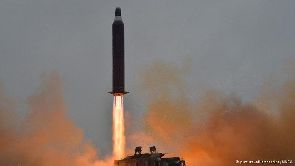South Korea’s president has doubled down on diplomacy at a time when tensions all around him are rising.
Days after North Korea announced it had successfully tested its first operational intercontintental ballistic missile (ICBM), South Korea’s Moon Jae-in declared he’d be willing to meet North Korean leader Kim Jong Un “at any time, at any place” — circumstances permitting.
Speaking in Berlin ahead of G20 talks in Hamburg, Moon said the reunification of East and West Germany gave him hope that peace could be achieved on the Korean Peninsula. “To Korea, which is the last divided nation on this planet, the experience of Germany’s unification gives hope for unification, and at the same time shows us the path that we need to follow,” he said.
Moon’s defense of diplomacy echoed former President Roh Moo-hyun’s “sunshine policy” towards Pyongyang, and his predecessor Kim Dae-jung’s “Berlin Doctrine,” outlined in the German capital 17 years ago. Moon described North Korea’s missile launch as “disappointing” and “reckless.” “Because we have reached the tipping point of the vicious circle of military escalation, and thus, the need for dialogue is more pressing than ever before,” he said.
Moon is a man stuck in the middle. On one hand, he is trying to maintain the possibility of talks, while on the other, he faces pressure from the South’s most powerful ally, the United States, to deliver a more robust response.
While China and Russia have called for concessions on both sides, the US has so far made no public move to open talks, instead opting to engage in a renewed show of force with Seoul through joint military exercises. US President Donald Trump’s administration is increasingly hawkish on the issue of North Korea.
In a news conference Thursday with Polish President Andrzej Duda, Trump said he has “some pretty severe things” available to him when asked about military action against North Korea.








